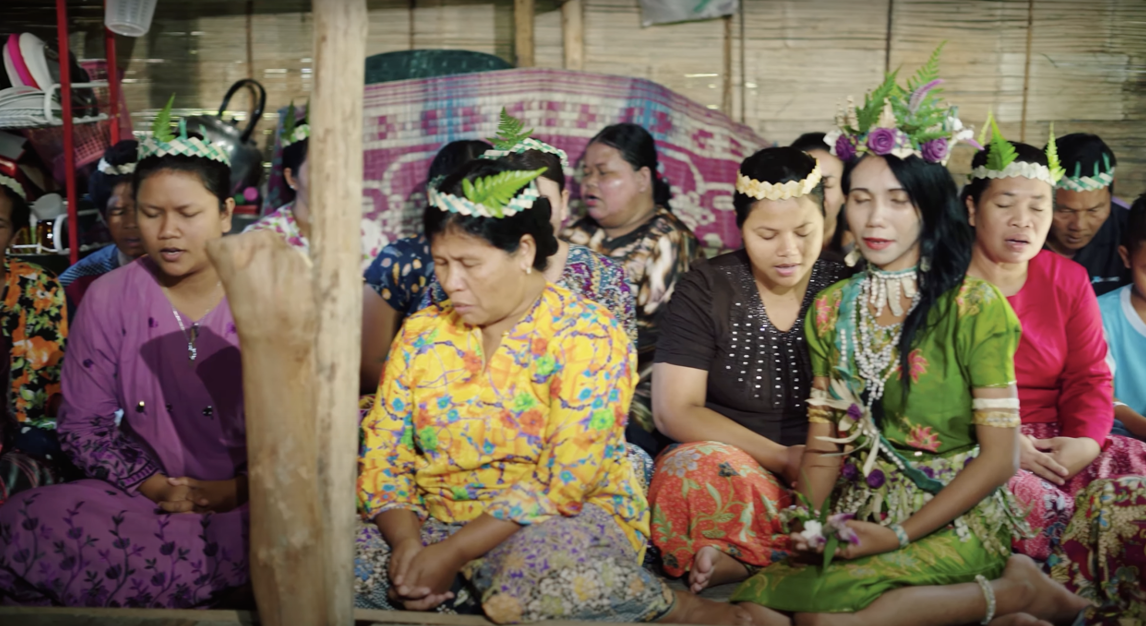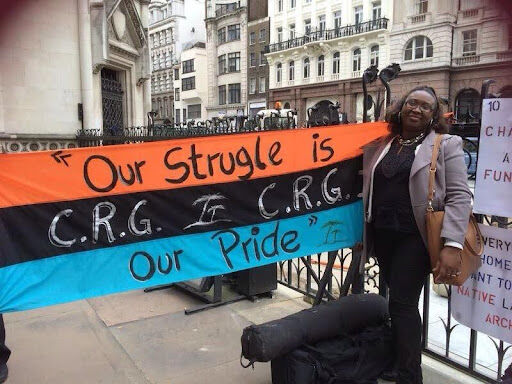HRC53: Annual Discussion on Women's Rights
The 53rd Session of the Human Rights Council
19th June –14th July 2023
Agenda Item 3 – Promotion and protection of all human rights, civil, political, economic, social and cultural rights, including the right to development
Annual full-day discussion on the human rights of women
30th June 2023
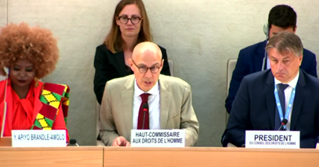
By Noor Sancho / GICJ
Executive Summary
In 2007, at its 6th session, the Human Rights Council decided in Resolution 6/30, to hold an annual full-day discussion on the human rights of women. The 2023 discussion featured two thematic panels: gender-based violence in public and political life and gender discrimination faced by women and girls in the context of social security and how active participation in decision-making may address such discrimination in line with international human rights standards.
The first panel focused on promoting measures to address gender-based violence against women and girls in public and political life in line with States’ human rights obligations to prevent, investigate and punish such violence and promote women’s participation. In his opening remarks, the United Nations High Commissioner for Human Rights highlighted that these gender-based violence acts are deliberate, very often sexist, and misogynistic, aiming to crush political activism and aspirations of women and girls by silencing their voices. He reiterated the need for these acts to be brought to light. Moreover, he recalled that achieving gender equality is central to the realisation of the Sustainable Development Goals agenda. The subsequent panellists discussed the exclusion from decision-making systems of women and education as a crucial tool to combat discrimination.
The second panel discussed how participation in decision-making may address current gaps in social security for women, with a focus on the intersectionality of discrimination. The panellists reminded the Council that social protection is a human right for all. They further recalled that universal social protection and the active and equal participation of women and girls is key, especially in times of social and economic instability, where social protection shields the most affected. In addition, the panellists reminded the importance of considering the gender dimension in the design of social security schemes. Furthermore, the panellists recalled that States need to ensure women and girls’ participation in social protection decision-making processes, since promoting the involvement of girls and women in social protection also ensured gender equality.
At this 53rd Human Rights Council session, Canada submitted draft proposal Resolution A/HRC/53/L.5 which intends to accelerate efforts to eliminate all forms of violence against women and girls, as well as preventing and responding to all forms of violence against women and girls in criminal justice detention.
Background
In 2007, at its 6th session, the Human Rights Council unanimously adopted resolution A/HRC/RES/6/30, entitled Integrating the human rights of women throughout the United Nations System.
The resolution reaffirmed the principle of gender equality and the need for the full implementation of the human rights of women. Moreover, according to the resolution, it was decided to hold an annual full-day discussion on the human rights of women, starting from 2008. The annual panel aims at discussing the human rights of women and girls, including measures that can be adopted by States and other stakeholders to address human rights violations experienced by women and girls.
Against this backdrop, the annual full-day discussion on the human rights of women in 2023 focused on two thematic panels of two hours duration each:
- Panel 1: Gender-based violence against women and girls in public and political life
- Panel 2: Social protection: women’s participation and leadership
Panel 1: Gender-based violence against women and girls in public and political life
Geneva, 30th June 2023 - At the 53rd session of the Human Rights Council, the Council held the first panel of the annual full-day discussion on the human rights of women.
The panel featured Mr. Václav Bálek, President of the Human Rights Council, Mr. Volker Türk, United Nations High Commissioner for Human Rights, Ms. Reem Alsalem, Special Rapporteur on violence against women and girls, its causes and consequences, and four panellists: Ms. Nicole Ameline, Member of the Committee on the Elimination of Discrimination against Women, Ms. Cristina Solano Díaz, Representative of the National Political Assembly of Indigenous Women of Mexico,, Ms. Yvonne Apiyo Brändle-Amolo, Member of the Swiss Parliament and President of the European Minority Parliamentarians Caucus and Ms. Houda Slim, President of the Arab Women Parliamentarians Network for Equality “Ra’edat”.
The first panel of the full-day discussion sought to discuss the equal participation of women in public life and their access to positions of political leadership and decision-making at all levels as a fundamental element to achieving gender equality.
In an effort to render the Human Rights Council more accessible to persons with disabilities, the panel offered international sign interpretation and real-time captioning.
 Mr. Volker Türk, the United Nations High Commissioner for Human Rights, delivered the opening statement. He recalled that while immense strides have been made in women’s public and political participation, major barriers persist. He added that to dismantle patriarchy, these barriers need to be removed. He further stated that around the world, many women and girls human rights defenders, women journalists and women who run for or hold public office and political decision-making positions are being attacked viciously and often suffer gender-based violence. In addition, he recalled that these abhorrent acts are deliberate, fed by pervasive structural discrimination and harmful misogynistic stereotypes. The High Commissioner mentioned that these acts are deeply woven into social and cultural norms, attitudes, and behaviours and that their purpose is to crush women’s political aspirations and activism. Likewise, he stated that around the world, women represent more than 2/3 of the world’s illiterate population. He added that according to a UN Woman study, 81.8% of surveyed women in Parliaments have experienced psychological violence and 25.5% have been subjected to physical violence. The High Commissioner recalled that a focus on prevention is key to combating gender-based violence and underlined measures to be implemented such as quotas, awareness campaigns and capacity building. Moreover, he reaffirmed the need to stop confining care work to women and to promote more equal sharing of these responsibilities. He also highlighted the importance of secondary and tertiary education and the necessity to raise the number of women in science studies. The High Commissioner further raised the issue of the visibility of women throughout history. Additionally, he recalled that globally, women outnumber male non-users of the internet. After paying tribute to the women involved in the elaboration of the UDHR, he recalled that women make up half of humanity and therefore gender-based violence is not an isolated question. Furthermore, he stated that SDG 5 is clear and added that without its achievement, the realisation of the SDG agenda will not be possible. Lastly, Mr. Volker Türk called upon States and the Council to pledge to take concrete and transformative action to tackle gender-based violence against women and girls in public and political life and to promote their participation and leadership. To conclude, he stated that the goal must be a world where every girl and every woman is free to rise, thrive and shape the course of History.
Mr. Volker Türk, the United Nations High Commissioner for Human Rights, delivered the opening statement. He recalled that while immense strides have been made in women’s public and political participation, major barriers persist. He added that to dismantle patriarchy, these barriers need to be removed. He further stated that around the world, many women and girls human rights defenders, women journalists and women who run for or hold public office and political decision-making positions are being attacked viciously and often suffer gender-based violence. In addition, he recalled that these abhorrent acts are deliberate, fed by pervasive structural discrimination and harmful misogynistic stereotypes. The High Commissioner mentioned that these acts are deeply woven into social and cultural norms, attitudes, and behaviours and that their purpose is to crush women’s political aspirations and activism. Likewise, he stated that around the world, women represent more than 2/3 of the world’s illiterate population. He added that according to a UN Woman study, 81.8% of surveyed women in Parliaments have experienced psychological violence and 25.5% have been subjected to physical violence. The High Commissioner recalled that a focus on prevention is key to combating gender-based violence and underlined measures to be implemented such as quotas, awareness campaigns and capacity building. Moreover, he reaffirmed the need to stop confining care work to women and to promote more equal sharing of these responsibilities. He also highlighted the importance of secondary and tertiary education and the necessity to raise the number of women in science studies. The High Commissioner further raised the issue of the visibility of women throughout history. Additionally, he recalled that globally, women outnumber male non-users of the internet. After paying tribute to the women involved in the elaboration of the UDHR, he recalled that women make up half of humanity and therefore gender-based violence is not an isolated question. Furthermore, he stated that SDG 5 is clear and added that without its achievement, the realisation of the SDG agenda will not be possible. Lastly, Mr. Volker Türk called upon States and the Council to pledge to take concrete and transformative action to tackle gender-based violence against women and girls in public and political life and to promote their participation and leadership. To conclude, he stated that the goal must be a world where every girl and every woman is free to rise, thrive and shape the course of History.
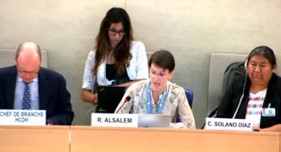 In her opening statement, Ms. Reem Alsalem, the Special Rapporteur on violence against women and girls and its causes and consequences, also reaffirmed that achieving gender equality is central to the realisation of the SDG agenda. She further recalled that achieving gender equality was not possible without the empowerment of women. Additionally, she regretted that women leaders and representatives continue to be vilified through misogynistic abuse, sexist language and body shaming, while their integrity, intelligence and values remain questioned. The Special Rapporteur recalled that attacks on womens’ access to public and political life relate to reasserting women’s rights, such as the right to seek education or access to reproductive rights. She added that it is only when women’s rights will be fully represented, when they can advocate for their own needs, participate equally in decision-making and have the resources to do so, that gender inequality will begin to be meaningfully tackled. Moreover, she stated that around the world, 9 out of 10 men and women hold biases against women. Lastly, she regretted that today, even the International Women’s Day is no longer without controversy. To conclude, she stated “we must stem the tide of violence against women and girls in the private, public, and political spheres of life, and we must do so now”.
In her opening statement, Ms. Reem Alsalem, the Special Rapporteur on violence against women and girls and its causes and consequences, also reaffirmed that achieving gender equality is central to the realisation of the SDG agenda. She further recalled that achieving gender equality was not possible without the empowerment of women. Additionally, she regretted that women leaders and representatives continue to be vilified through misogynistic abuse, sexist language and body shaming, while their integrity, intelligence and values remain questioned. The Special Rapporteur recalled that attacks on womens’ access to public and political life relate to reasserting women’s rights, such as the right to seek education or access to reproductive rights. She added that it is only when women’s rights will be fully represented, when they can advocate for their own needs, participate equally in decision-making and have the resources to do so, that gender inequality will begin to be meaningfully tackled. Moreover, she stated that around the world, 9 out of 10 men and women hold biases against women. Lastly, she regretted that today, even the International Women’s Day is no longer without controversy. To conclude, she stated “we must stem the tide of violence against women and girls in the private, public, and political spheres of life, and we must do so now”.
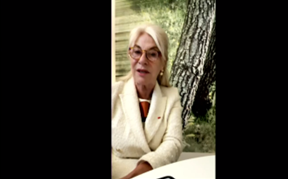 Ms. Nicole Ameline, member of the Committee on the Elimination of Discrimination against Women, was the first panellist. She recalled that the first violence perpetrated against women is linked to the de facto exclusion from decision-making systems of women, that only represent about 25 percent of parliamentarians around the world. She called for a change of paradigm, stating that only a global momentum could affect change, under the Convention on the Elimination of All Forms of Discrimination against Women. The goal of this paradigm shift would be to accelerate and innovate in depth the vision of the consolidation of the rights of women. This new methodology would seek to promote new practices and measures such as establishing electoral equality on clear specific goals. Moreover, she reminded the Council that this new approach should be turned towards younger generations. Additionally, she added that women’s rights are critical to many of the great challenges of our times: climate change, artificial intelligence and migration. Furthermore, she urged the international community to combat all forms of stereotypes and new forms of discrimination, such as hate speech or threats and harassment on social networks. She concluded by recalling that empowering women and girls through education is a considerable factor in establishing the implementation of the CEDAW Convention. Lastly, she called all Member States to join the initiative so that it can be a historic evolution of all rights.
Ms. Nicole Ameline, member of the Committee on the Elimination of Discrimination against Women, was the first panellist. She recalled that the first violence perpetrated against women is linked to the de facto exclusion from decision-making systems of women, that only represent about 25 percent of parliamentarians around the world. She called for a change of paradigm, stating that only a global momentum could affect change, under the Convention on the Elimination of All Forms of Discrimination against Women. The goal of this paradigm shift would be to accelerate and innovate in depth the vision of the consolidation of the rights of women. This new methodology would seek to promote new practices and measures such as establishing electoral equality on clear specific goals. Moreover, she reminded the Council that this new approach should be turned towards younger generations. Additionally, she added that women’s rights are critical to many of the great challenges of our times: climate change, artificial intelligence and migration. Furthermore, she urged the international community to combat all forms of stereotypes and new forms of discrimination, such as hate speech or threats and harassment on social networks. She concluded by recalling that empowering women and girls through education is a considerable factor in establishing the implementation of the CEDAW Convention. Lastly, she called all Member States to join the initiative so that it can be a historic evolution of all rights.
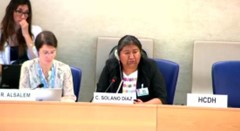 Ms. Cristina Solana Diaz, Representative of the National Political Assembly of Indigenous Women of Mexico recalled that indigenous women are faced with major challenges due to the structural inequalities in Mexico and around the world. She mentioned that there are over 11 million Indigenous women in Mexico facing structural violence, discrimination and institutional racism, which hinders their participation in public and political life. In addition, she urged all State Parties to the CEDAW Convention to implement the Committee’s general recommendation on indigenous women and girls, which addresses violence and political participation. As a candidate for a local deputy in Mexico, she recalled facing violence and discrimination. Lastly, she called on States to design, together with indigenous women, a national program to strengthen the political participation of indigenous women within local communities.
Ms. Cristina Solana Diaz, Representative of the National Political Assembly of Indigenous Women of Mexico recalled that indigenous women are faced with major challenges due to the structural inequalities in Mexico and around the world. She mentioned that there are over 11 million Indigenous women in Mexico facing structural violence, discrimination and institutional racism, which hinders their participation in public and political life. In addition, she urged all State Parties to the CEDAW Convention to implement the Committee’s general recommendation on indigenous women and girls, which addresses violence and political participation. As a candidate for a local deputy in Mexico, she recalled facing violence and discrimination. Lastly, she called on States to design, together with indigenous women, a national program to strengthen the political participation of indigenous women within local communities.
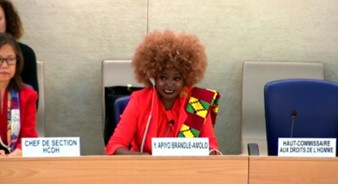 Ms. Yvonne Apiyo Brändle-Amolo, Member of the Swiss Parliament and President of the European Minority Parliamentarians Caucus, regretted that women facing multiple and intersecting forms of discrimination often experienced even greater obstacles to political and public participation. That was the reason for the launch of the European Minority Parliamentarians Caucus, a safe space where marginalised communities discuss these forms of violence and map out solutions. She stated that the Caucus had identified five major categories of gender-based violence: intersectional discrimination; stereotypes and prejudices; marginalisation and lack of representation; power dynamics and threats to existing hierarchies; and a lack of support systems. In addition, she mentioned that at the Caucus, female parliamentarians narrated how their reports of sexism and racism from members of their own parties had been ignored. Moreover, she called for a proactive intersectional approach that recognises the interplay of different marginalised identities. Finally, she mentioned that the Caucus formed a network that collaborates with artists to use innovative ways to raise awareness. To conclude, she urged States Parties to CEDAW to promote and provide support and resources for women to live in public life free from violence and discrimination.
Ms. Yvonne Apiyo Brändle-Amolo, Member of the Swiss Parliament and President of the European Minority Parliamentarians Caucus, regretted that women facing multiple and intersecting forms of discrimination often experienced even greater obstacles to political and public participation. That was the reason for the launch of the European Minority Parliamentarians Caucus, a safe space where marginalised communities discuss these forms of violence and map out solutions. She stated that the Caucus had identified five major categories of gender-based violence: intersectional discrimination; stereotypes and prejudices; marginalisation and lack of representation; power dynamics and threats to existing hierarchies; and a lack of support systems. In addition, she mentioned that at the Caucus, female parliamentarians narrated how their reports of sexism and racism from members of their own parties had been ignored. Moreover, she called for a proactive intersectional approach that recognises the interplay of different marginalised identities. Finally, she mentioned that the Caucus formed a network that collaborates with artists to use innovative ways to raise awareness. To conclude, she urged States Parties to CEDAW to promote and provide support and resources for women to live in public life free from violence and discrimination.
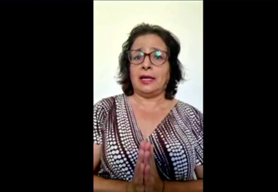 Ms. Houda Slim, President of the Arab Women Parliamentarians Network for Equality “Ra’edat”, mentioned that in Tunisia, the number of female members of parliament has declined from 37 percent to 17 percent and in Algeria the quota system had been cancelled. She added that in Libya and in the Sudan, war and political instability has affected the presence of women in political life. The numbers of female representatives are also declining in other Arab States, where women are discouraged from running for office. According to a study of women in Arab States, conducted by the Network for Equality, 80 percent of respondents had been subjected to threats of abduction and sexual assault, therefore discouraging women from participating in political life. Moreover, she stated that the result of this violence is fear. She further recalled that violence is present on social media and traditional media and at political events and public gatherings. Lastly, she recommended to use education as a crucial tool to change mindsets, adopt preventive legislation and deterrent laws and cooperate with religious leaders to ensure that religious discourses dissuade violence.
Ms. Houda Slim, President of the Arab Women Parliamentarians Network for Equality “Ra’edat”, mentioned that in Tunisia, the number of female members of parliament has declined from 37 percent to 17 percent and in Algeria the quota system had been cancelled. She added that in Libya and in the Sudan, war and political instability has affected the presence of women in political life. The numbers of female representatives are also declining in other Arab States, where women are discouraged from running for office. According to a study of women in Arab States, conducted by the Network for Equality, 80 percent of respondents had been subjected to threats of abduction and sexual assault, therefore discouraging women from participating in political life. Moreover, she stated that the result of this violence is fear. She further recalled that violence is present on social media and traditional media and at political events and public gatherings. Lastly, she recommended to use education as a crucial tool to change mindsets, adopt preventive legislation and deterrent laws and cooperate with religious leaders to ensure that religious discourses dissuade violence.
After the presentations by the panellists, delegations took the floor for interventions. The European Union expressed its concerns over the worldwide backlash concerning women’s rights and condemned the reprisals against women both offline and online. Latvia, on behalf of the Nordic countries, asked the panel to share best practices to address the challenges posed to the equal participation of women. Pakistan reaffirmed its commitment to combat all forms of violence against women and girls. The Bahamas, on behalf of the Caribbean community, recalled that equal participation of women is fundamental to achieve gender equality. Türkiye, on behalf of the Members and Observers of the Organisation of Turkish States recognised the need for stronger laws and safe environments to seek help for victims. Belgium, on behalf of 48 countries, reiterated that gender-based violence pushes women to self-censorship and sends the message that women and girls in general have no place in public life. The Plurinational State of Bolivia stated that the capitalist system makes women invisible and that since its Democratic Cultural Revolution, the country has made progress towards undoing the patriarchy within its society. Australia on behalf of Malaysia called for more participation amongst States to achieve gender equality. Costa Rica, on behalf of Mexico and 90 states, recalled that last year, a resolution was adopted to celebrate the contribution of women in shaping global affairs and reaffirmed that this day represented an opportunity to take measures to enable women’s full participation in public and political life.
When the President gave the floor to National Human Rights Institutions and civil society organizations, they underscored that hatred and online violence remains widespread and mentioned that 69 percent of women parliamentary candidates reported sexual harassment on social media during their election campaign. Civil society also reaffirmed that ensuring participation of women without fear is an integral part of preserving democracy and the rule of law and denounced the direct discrimination prevailing in Afghanistan and Iran.
In their concluding remarks, the panellists called for more political will and recalled the need to stop seeing women only as victims. They further reaffirmed the importance of establishing mechanisms for women of Indigenous and African descent. They recommended political parties to facilitate women’s access to political roles through fundings, and urged State Parties to the CEDAW Convention to increase awareness, ensure certain seats for marginalised women in Parliaments, support a solidarity network and give access to counselling for people in marginalised communities. Finally, the panellists called for gender violence to be considered as an issue that is as dangerous as nuclear weapons and urged Member States to implement measures as strict as the ones adopted for nuclear weapons, such as preventive and punishing laws.
Panel 2: Social protection: women’s participation and leadership
Geneva, 30th June 2023 - The second panel, at the 53rd Human Rights Council session, discussed how participation in decision-making may address current gaps in social security for women, with a focus on the intersectionality of discrimination.
The panel featured Mr. Mahamane Cisse-Gouro, Director of the Human Rights Council and Treaty Mechanisms Division, Office of the United Nations High Commissioner for Human Rights, Mr. Olivier De Schutter, Special Rapporteur on extreme poverty and human rights as the moderator, and three panellists, Ms. Michele LeVoy, Director of the Platform for International Cooperation on Undocumented Migrants, Ms. Yamikani, a girl activist from Malawi and Ms. Monica Ferro, Director of the Geneva Office of the United Nations Population Fund.
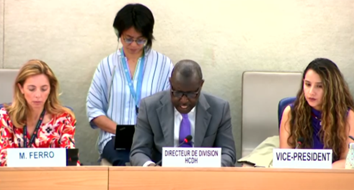 In his opening statement, Mr. Mahamane Cisse Gouro, Director of the Human Rights Council and Treaty Mechanisms Division, Office of the United Nations High Commissioner for Human Rights, recalled that social protection is a human right firmly embedded in the Universal Declaration of Human Rights and international human rights law and a key lever in achieving the Sustainable Development Goals. He reaffirmed that the common agenda calls for a new social contract, including universal social protection. Additionally, he mentioned that only 26.3 percent of women worldwide are covered by pension schemes and that women have less access to formal employment. He further added that migrant women often struggle to access social protection due to their employment in the informal economy and that women with disabilities are particularly affected. In addition, he stated that women and girls must have a say in decisions that affect them. In Latin America, the demands of movements promoting women’s rights have resulted in programs for domestic workers to gain access to formal employment and social protection. In Asia, there are instances where women leaders have played a crucial role in ensuring access to social protection schemes by giving a voice to vulnerable villages. He stressed the need for a new social contract based on equal rights and opportunities for all. In closing, he highlighted that participation is imperative to deliver on women and girls’ equal enjoyment of social protection and that Member States, working with women and girls in all their diversity, can make this happen.
In his opening statement, Mr. Mahamane Cisse Gouro, Director of the Human Rights Council and Treaty Mechanisms Division, Office of the United Nations High Commissioner for Human Rights, recalled that social protection is a human right firmly embedded in the Universal Declaration of Human Rights and international human rights law and a key lever in achieving the Sustainable Development Goals. He reaffirmed that the common agenda calls for a new social contract, including universal social protection. Additionally, he mentioned that only 26.3 percent of women worldwide are covered by pension schemes and that women have less access to formal employment. He further added that migrant women often struggle to access social protection due to their employment in the informal economy and that women with disabilities are particularly affected. In addition, he stated that women and girls must have a say in decisions that affect them. In Latin America, the demands of movements promoting women’s rights have resulted in programs for domestic workers to gain access to formal employment and social protection. In Asia, there are instances where women leaders have played a crucial role in ensuring access to social protection schemes by giving a voice to vulnerable villages. He stressed the need for a new social contract based on equal rights and opportunities for all. In closing, he highlighted that participation is imperative to deliver on women and girls’ equal enjoyment of social protection and that Member States, working with women and girls in all their diversity, can make this happen.
Mr. Olivier De Schutter, Special Rapporteur on extreme poverty and human rights, moderated the panel. He stated that it is the duty of States to consider the gender dimension in the design of social security schemes.
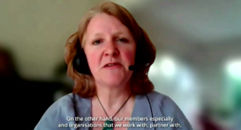 Ms. Michele Levoy, Director of the Platform for International Cooperation on Undocumented Migrants, the first panellist, recognised that some advances in the legal and policy framework in Europe, concerning access to health care, justice and labour rights for undocumented migrants had been enhanced through the participation of migrant women. Moreover, she stated that multi-stakeholder involvement is crucial for policy change in the field of health. She added that the international community should build on decades of experience in Europe in implementing laws and policies and look constructively at solutions to ensure universal health care for all, regardless of migration status. Finally, she recalled that data protection is essential to ensure access to services and justice for undocumented migrant workers.
Ms. Michele Levoy, Director of the Platform for International Cooperation on Undocumented Migrants, the first panellist, recognised that some advances in the legal and policy framework in Europe, concerning access to health care, justice and labour rights for undocumented migrants had been enhanced through the participation of migrant women. Moreover, she stated that multi-stakeholder involvement is crucial for policy change in the field of health. She added that the international community should build on decades of experience in Europe in implementing laws and policies and look constructively at solutions to ensure universal health care for all, regardless of migration status. Finally, she recalled that data protection is essential to ensure access to services and justice for undocumented migrant workers.
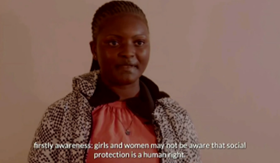 Ms. Yamikani, a girl activist from Malawi, raised concerns over the lack of funding for social protection. She regretted that it is not being taken seriously enough. She reaffirmed that social protection is a children’s right. Moreover, she stated that Member States need to ensure the participation of girls and women in social protection decision-making processes. She recalled that social protection helps people who live in poverty to meet their needs and address the impacts of poverty. Furthermore, she stated that children appreciate established social protection programmes that aim to end poverty and donors who provide financial support. However, she raised concerns over the coverage of children in these programmes that is still widely limited. Sadly, funding for social protection is still very low, especially from Government budgets. Lastly, she recommended that Member States establish partnerships involving women and girls and to raise awareness to empower women and children through targeted initiatives.
Ms. Yamikani, a girl activist from Malawi, raised concerns over the lack of funding for social protection. She regretted that it is not being taken seriously enough. She reaffirmed that social protection is a children’s right. Moreover, she stated that Member States need to ensure the participation of girls and women in social protection decision-making processes. She recalled that social protection helps people who live in poverty to meet their needs and address the impacts of poverty. Furthermore, she stated that children appreciate established social protection programmes that aim to end poverty and donors who provide financial support. However, she raised concerns over the coverage of children in these programmes that is still widely limited. Sadly, funding for social protection is still very low, especially from Government budgets. Lastly, she recommended that Member States establish partnerships involving women and girls and to raise awareness to empower women and children through targeted initiatives.
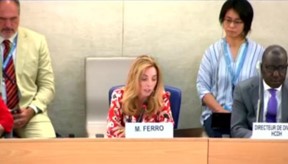 Ms. Monica Ferro, Director of the Geneva Office of the United Nations Population Fund recalled the need of a global economy that removes all obstacles and empowers women to choose their future, and to own their decisions. She called on the international community to lay the foundations for a gender transformative social protection system that ensures girls’ incorporation to the labour market and equal opportunities by promoting demographic dividend strategies. She further stressed the importance of recognising the value of unpaid care work. Lastly, she reaffirmed that social protection systems designed with a gender transformative lens are pivotal to createa world where everyone can live with dignity and fulfil their right to be outrageously happy.
Ms. Monica Ferro, Director of the Geneva Office of the United Nations Population Fund recalled the need of a global economy that removes all obstacles and empowers women to choose their future, and to own their decisions. She called on the international community to lay the foundations for a gender transformative social protection system that ensures girls’ incorporation to the labour market and equal opportunities by promoting demographic dividend strategies. She further stressed the importance of recognising the value of unpaid care work. Lastly, she reaffirmed that social protection systems designed with a gender transformative lens are pivotal to createa world where everyone can live with dignity and fulfil their right to be outrageously happy.
Delegations then took the floor for interventions. Among these, Mauritius, on behalf of a group of Small Island Developing States, pointed out the need to increase the number of women in the workforce. UN Women highlighted the need of investing in robust social protection to put the SDGs back on track and further recalled that social protection systems must respond to the needs of whom they are meant to serve. The agency added that under the Global Accelerator on Jobs and Social protection for Just Transition, UN Women is working alongside other agencies to support countries to create 400 million decent jobs and extend social coverage to the 2 billion who are currently excluded. Chili reaffirmed that including a gender perspective is crucial when it comes to putting in place public policies that aim to have significant impacts on women and girls’ economic and social empowerment, including social protection programs. Kazakhstan, on behalf of the Organisation of Turkish States, recalled that achievement of full human potential is not possible if one half of the Humanity continues to be denied its full human rights and opportunities, including the right to social security. New Zealand, on behalf of Australia and Canada, reaffirmed the need to ensure access to a liveable income and accessible health services to all women and girls.
Civil Society organisations recalled that it is still mostly women, mothers and daughters who carry out domestic essential tasks, thus restricting their ability to benefit from social security systems, which are usually connected to formal work. One NGO pointed out that 649 million women still lack adequate maternity protection and called on Member States to recognise unpaid care work.
In his concluding remarks, Mr. Olivier De Schutter cited the position put forward by different parts of civil society in particular the fact that women not only work for free, but also at a cost to themselves. He further added that women disproportionately shoulder the unpaid and unrecognised work within households and communities. At the same time, social protection systems are not adapted to value this type of work, resulting in a double burden being imposed on women. The three panellists recommended to reform the legal frameworks at a national level for undocumented migrants to benefit from protection in case they have a workplace accident. Likewise, they underlined that participation is a children’s right and that the voice of children should be prioritised. Lastly, the panellists voiced the need that social protection mechanisms be built to be gender transformative.
Geneva International Centre for Justice’s position
Geneva International Centre for Justice welcomes the annual 2023 full-day discussion on the human rights of women for shedding light on two relevant issues regarding women’s human rights. GICJ stands firm in the belief that promoting the full and equal participation of women in all spheres of public and political life is key to achieve gender equality. In this regard, GICJ calls upon the international community to take effective measures to combat gender-based stereotypes and gender-based violence on social media and ensure women’s full representation in their diversity on media outlets.
Additionally, GICJ encourages States to put an end to political violence faced by women during their political campaigns and to establish quotas to increase the meaningful participation of women in political life, so that women in politics become the norm rather than the exception. Furthermore, GICJ calls on States to take measures to implement full universal social protection for all, including for women working in the informal economy and within households. Moreover, GICJ urges the international community to acknowledge the double burden that women carry and recognise unpaid domestic and care work and its value. GICJ further stresses that States must include women, girls, and children in all decision-making processes related to their own rights.
In addition, GICJ urges the international community to take measures at an international level rather than at a domestic one and increase resources for women that run for office without being on a political party’s list. Lastly, GICJ recommends States to implement preventive and punitive laws to fight gender-based violence, use education as a tool and engage with religious actors in order to create a new generation, free of biases and stereotypes.
HRC53, Women’s Rights, HumanRightsViolations, Special Rapporteur, Human Rights, Geneva, GICJ, Geneva4justice, Geneva International Centre for Justice




